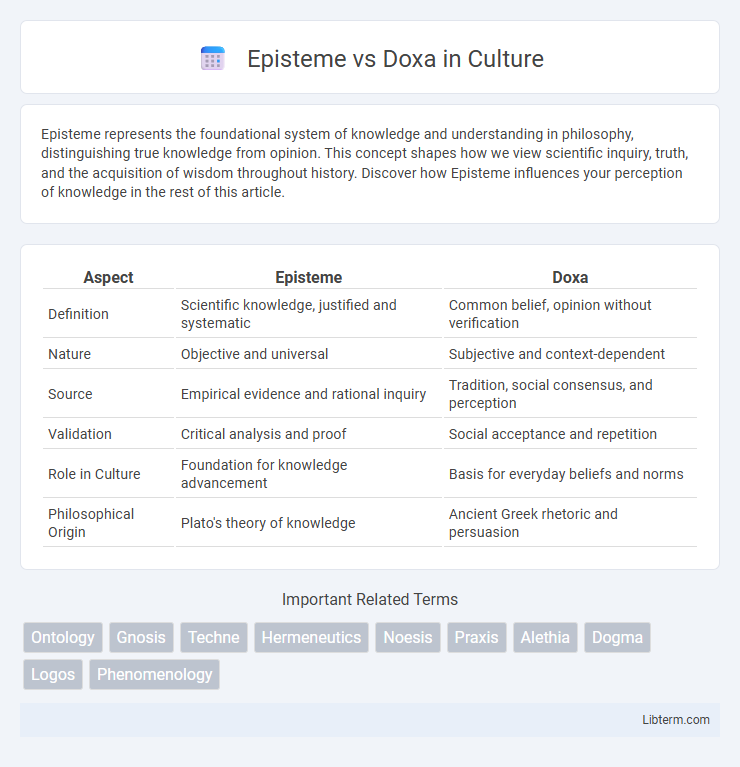Episteme represents the foundational system of knowledge and understanding in philosophy, distinguishing true knowledge from opinion. This concept shapes how we view scientific inquiry, truth, and the acquisition of wisdom throughout history. Discover how Episteme influences your perception of knowledge in the rest of this article.
Table of Comparison
| Aspect | Episteme | Doxa |
|---|---|---|
| Definition | Scientific knowledge, justified and systematic | Common belief, opinion without verification |
| Nature | Objective and universal | Subjective and context-dependent |
| Source | Empirical evidence and rational inquiry | Tradition, social consensus, and perception |
| Validation | Critical analysis and proof | Social acceptance and repetition |
| Role in Culture | Foundation for knowledge advancement | Basis for everyday beliefs and norms |
| Philosophical Origin | Plato's theory of knowledge | Ancient Greek rhetoric and persuasion |
Understanding Episteme: Definition and Origins
Episteme, rooted in ancient Greek philosophy, refers to true knowledge characterized by certainty and scientific understanding. Originating from thinkers like Plato and Aristotle, episteme contrasts with doxa, which denotes opinion or belief lacking rigorous proof. This concept emphasizes systematic inquiry and rational justification as foundational to genuine knowledge.
Doxa Explained: Meaning and Historical Background
Doxa refers to common belief or opinion, often contrasted with episteme, which denotes true knowledge or scientific understanding. Originating from ancient Greek philosophy, particularly in the works of Plato and Aristotle, doxa represents perceptions and assumptions held by the majority without rigorous validation. Historically, doxa has been viewed as a preliminary form of knowledge prone to error, serving as a foundation for philosophical inquiry into the nature of truth and knowledge.
Philosophical Foundations: Plato on Episteme and Doxa
Plato distinguishes episteme as true, justified knowledge grounded in rational insight and eternal truths, contrasting it with doxa, which represents mere opinion or belief based on sensory experience and subjective perception. In dialogues like "The Republic," he conceptualizes episteme as knowledge of the Forms, accessible through dialectical reasoning, while doxa reflects the shifting and unreliable opinions held by the masses. This foundational distinction shapes epistemology by emphasizing the pursuit of immutable knowledge (episteme) over fluctuating and often deceptive beliefs (doxa).
Episteme vs Doxa: Key Differences
Episteme refers to true, scientific knowledge grounded in rational justification, while doxa represents common belief or opinion lacking rigorous proof. Episteme is objective, reliable, and universal, contrasting with the subjective, variable, and often erroneous nature of doxa. This distinction underscores the epistemological divide between knowledge validated through reason and mere assumption shaped by social consensus.
The Role of Episteme in Scientific Knowledge
Episteme represents true, justified knowledge grounded in reason and empirical evidence, crucial for scientific inquiry and discovery. Unlike doxa, which refers to common beliefs or opinions, episteme underpins the development of reliable theories and reproducible results in science. The rigorous application of episteme ensures that scientific knowledge remains objective, verifiable, and progressively accumulative.
Doxa in Everyday Beliefs and Opinions
Doxa represents the realm of everyday beliefs and opinions held by individuals within a society, often shaped by cultural norms, traditions, and unexamined assumptions. These beliefs lack rigorous justification or critical scrutiny, contrasting with Episteme, which embodies systematic, justified knowledge. The prevalence of Doxa influences social behavior and collective decision-making, highlighting its significance in the formation of shared perceptions and common sense.
Episteme and Truth: Pursuing Objective Knowledge
Episteme represents the pursuit of objective knowledge grounded in truth, emphasizing systematic understanding and rational inquiry. Unlike doxa, which refers to common beliefs or opinions often influenced by perception and subjectivity, episteme seeks verifiable facts and universal principles. This distinction highlights the central role of episteme in fields such as science and philosophy where truth is determined through evidence, logic, and critical analysis.
The Impact of Doxa on Public Discourse
Doxa, representing common beliefs or popular opinions, significantly shapes public discourse by influencing societal norms and collective values. It often frames debates, guiding public understanding and acceptance of information despite lacking rigorous evidence or epistemic justification. This dominance of doxa can hinder the pursuit of episteme, or true knowledge, by perpetuating misconceptions and limiting critical analysis in media and political communication.
Episteme, Doxa, and Modern Epistemology
Episteme refers to true, scientific knowledge grounded in reason and evidence, contrasting with Doxa, which signifies common belief or opinion lacking rigorous justification. Modern epistemology builds on the concept of Episteme by systematically analyzing the nature, sources, and limits of knowledge through critical inquiry and logical analysis. This discipline investigates how justified beliefs transform into Episteme, distinguishing knowledge from mere Doxa in contemporary philosophical and scientific contexts.
Bridging Episteme and Doxa: Applications in Critical Thinking
Bridging episteme (true knowledge) and doxa (common belief) enhances critical thinking by fostering deeper analytical skills and promoting reflective judgment. Integrating epistemic rigor with everyday opinions challenges cognitive biases, enabling individuals to evaluate information more effectively across disciplines. This approach supports the development of nuanced perspectives, essential for problem-solving and decision-making in educational and professional contexts.
Episteme Infographic

 libterm.com
libterm.com